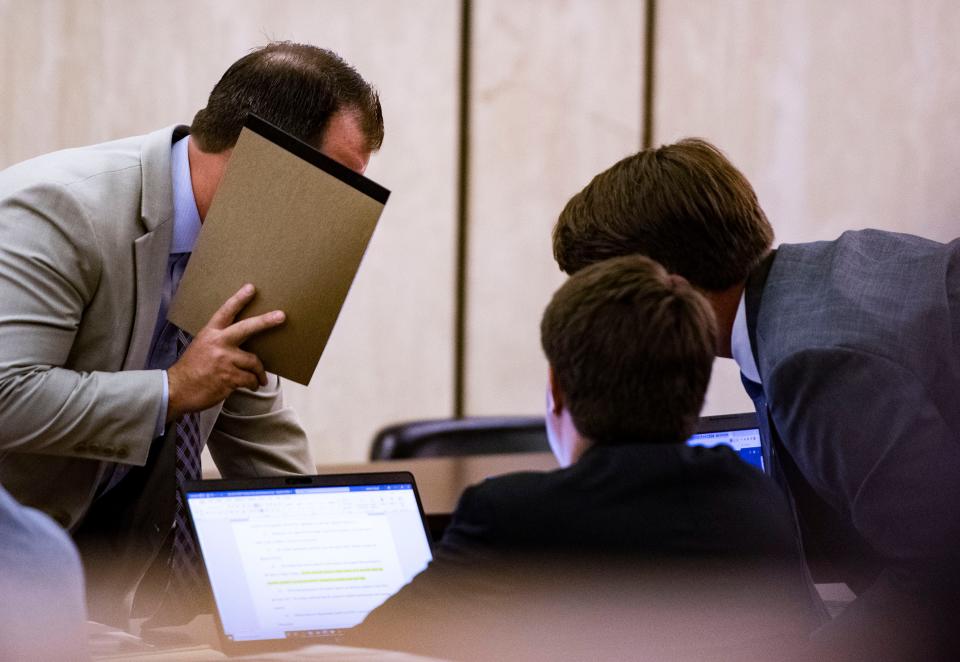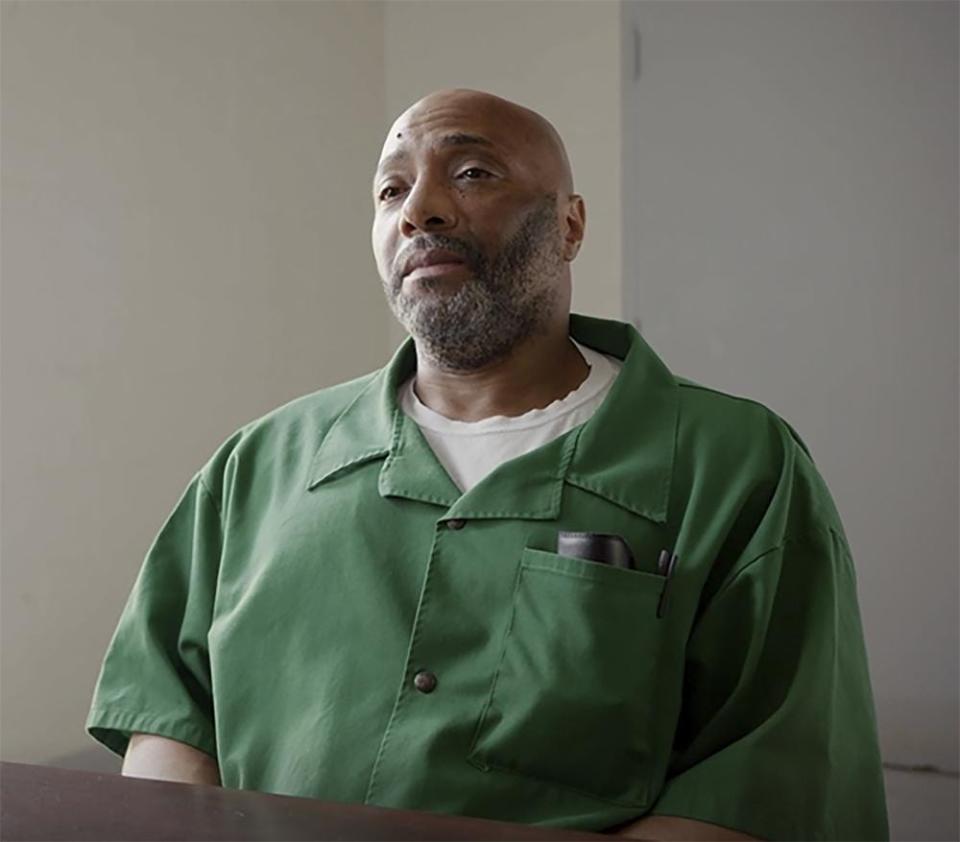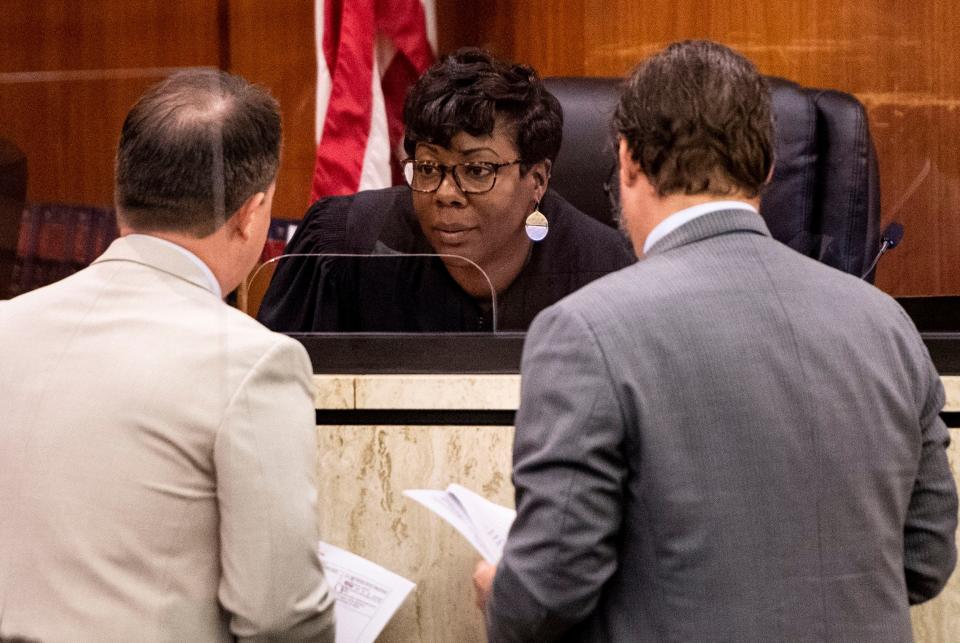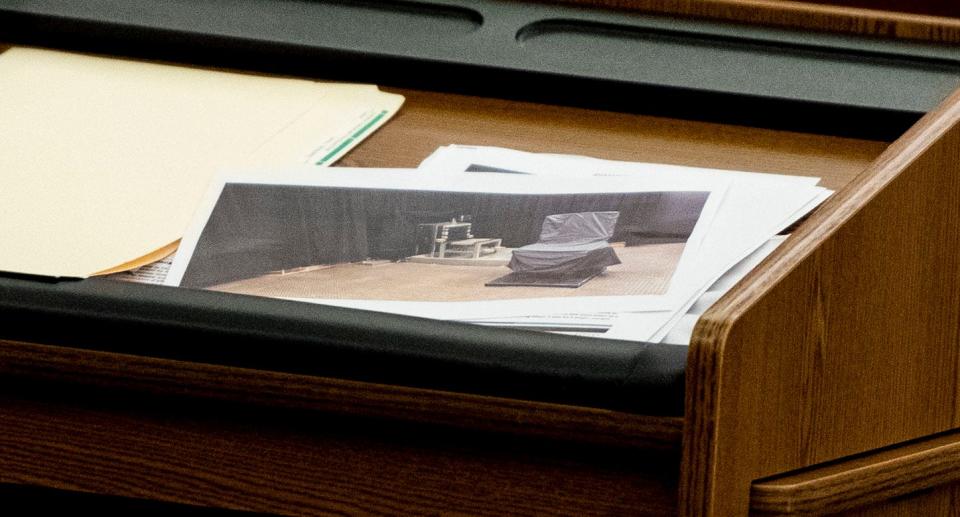Questions, issues still to be resolved in years-long case against death penalty in SC
In an effort to resume executions in South Carolina after over a decade, the state Department of Corrections has notified the state Supreme Court that the agency now has the drugs to carry out lethal injection executions.
In an affidavit submitted to the court on Tuesday, Sept. 19, SCDC Director Bryan Stirling stated that the Department was able to obtain pentobarbital, a common sedative used in lethal injection executions, after making over 1,300 contacts in search of the drugs.
The affidavit was submitted along with a motion to vacate a circuit court order from Sept. 2022 that declared the state’s other methods of execution, the firing squad and electric chair, unconstitutional and to dismiss the case entirely.
The department has struggled to obtain drugs for lethal injection executions since 2013 and the last execution carried out in the state was in 2011.
"Justice has been delayed for too long in South Carolina," Gov. Henry McMaster said in a statement Tuesday. "This filing brings our state one step closer to being able to once again carry out the rule of law and bring grieving families and loved ones the closure they are rightfully owed.”

Attorneys with Justice 360, a nonprofit organization in SC working to reform policies and practices in capital cases, representing four men on death row have 10 days to respond to the state’s motion, according to rules governing the state appellate court, and then the state Supreme Court will have to decide how to proceed.
"Attorneys for the Plaintiffs are currently reviewing and will respond to the Department of Corrections filings in the South Carolina Supreme Court," Lindsey Vann, executive director for Justice 360 said in a statement on Wednesday. "There still remain important questions about the efficacy of the execution drugs obtained and, given that the statute provides inmates with a choice of execution methods, the circuit court’s findings that the electric chair and the firing squad are unconstitutional need to be resolved."
Here is what to know about the years-long case against the death penalty in South Carolina:
Shield law passes in SC, securing access to lethal injection drugs
Among the 1,300 contacts Stirling said SCDC made in the search for lethal injection drugs were “manufacturers, suppliers, compounding pharmacies, other States’ Departments of Corrections and potential sources that the Department learned about from the relationships that Department employees have with other individuals in penological institutions.”
Stirling credited the state’s shield statute, signed into law by Gov. McMaster in May, with the department's ability to eventually obtain pentobarbital.
The law states that any identifying information about a person or entity that participates in the planning or administration of an execution will be confidential, even through legal discovery. It also makes disclosure of such information about a former or current member of an execution team or their immediate family subject to imprisonment for up to three years.
Shield law and accountability: SC once obtained execution drugs overseas.
Proponents against the shield law said similar legislation across the country has created a “black hole” of information around execution protocols.
“It’s startling the lengths to which states will go to get drugs for lethal injection and escape any kind of oversight,” Alexandra Klein, a professor at St. Mary’s School of Law in Texas who researches capital punishment, said in April. “This is one of the most intense things the government can do, and they do it without such little transparency. It’s very troubling.”
Little is known about South Carolina’s death penalty protocols to begin with. According to the Death Penalty Information Center, SC is one of the only states that doesn’t make its execution protocols publicly available. The only version obtained from the Freedom of Information Act (FOIA) is from 2002 and is heavily redacted.
In Stirling’s affidavit, he noted the Department has revised its lethal injection policy to “provide the use of one-drug protocol” in contrast to a three-drug protocol used in prior executions.
The affidavit states the one-drug protocol with pentobarbital is “essentially identical to the protocol used by the Federal Bureau of Prisons and at least six other states.”
However, the U.S. Department of Justice announced a national moratorium on federal executions in 2021 while the department reviews execution policies and procedures. In Sept. 2022 the Department requested information about the use of pentobarbital in regard to the risk of pain and suffering associated with the use of the drug. The use of the drug has been central to lawsuits filed following federal executions carried out in 2020.
South Carolina’s shield law also states that no drug shall be used in an execution unless approved by the Food and Drug Administration. However, in 2019, the U.S. DOJ determinedthe FDA does not have any obligation to regulate drugs for the use of capital punishment.
“Congress has repeatedly authorized the death penalty on the assumption that there are lawful means to carry it out, but the regulation of such articles under the FDCA (Federal Food, Drug, and Cosmetic Act) would effectively require their prohibition because they could hardly be found 'safe and effective' for such an intended use,” an opinion issued by the DOJ in 2019 said.
Similar to other death penalty states, South Carolina officials have proposed the use of compounding pharmacies, or a pharmacy that customizes drugs that are not mass manufactured.
These pharmacies are also not FDA-approved. In some cases, the use of compounding pharmacies has already created concerns around expired products.
Dig deeper: Shield laws haven’t stopped problems with executions, but they have kept them hidden

Motion seeks to reverse constitutionality ruling on firing squad, electric chair
The state Supreme Court initially requested more information about SCDC’s efforts to obtain drugs for lethal injection drugs after hearing arguments to appeal a trial judge’s order that the state’s alternative methods of execution ― the firing squad and electric chair ― are unconstitutional.
Now that the state has obtained drugs for lethal injection, attorneys representing SCDC and Gov. McMaster argue the order should be reversed and the case dismissed.
“Now that all three statutorily authorized methods are available to SCDC and Respondents may elect lethal injection, there is nothing left for any court to decide in this case,” the attorneys wrote in their motion on Sept. 19.
In May 2021, McMaster signed legislation that made the default method of execution the electric chair and added an additional option for the firing squad.
“A person convicted of a capital crime and having imposed upon him the sentence of death shall suffer the penalty by electrocution or, at the election of the convicted person, by firing squad or lethal injection, if it is available at the time of election,” the revised statute says.

But when the state attempted to schedule executions for Brad Sigmon and Freddie Eugene Owens, both of Greenville, a month after the legislation was enacted, the firing squad policies and procedures were not yet in place, so the executions were stayed.
That same month, a lawsuit alleging that the two methods are prohibited by the state's constitution was filed on behalf of Owens and Sigmon by attorneys with Justice 360. Richard Moore, of Spartanburg, and Gary Dubose Terry, of Lexington, were later added to the case.
In April 2022, Judge Jocelyn Newman heard a week’s worth of debate on the constitutionality of the firing squad and electric chair.
Expert witnesses for both sides debated the meaning of pain and consciousness, and definitions of cruel, unusual and corporal punishment, which is prohibited by the state constitution.
Ultimately, in Sept. 2022, Judge Newman ruled the methods were unconstitutional.
"In 2021, South Carolina turned back the clock and became the only state in the country in which a person may be forced into the electric chair if he refuses to elect how he will die. In doing so, the General Assembly ignored advances in scientific research and evolving standards of humanity and decency," the order read.
The case against SC's death penalty: Does it violate the state's constitution?

However, during the trial, Newman granted a protective order during the pretrial phase that barred attorneys from inquiring about SCDC’s efforts in obtaining drugs for lethal injection during the discovery process. Attorneys for SCDC argued such discovery was irrelevant because Justice 360 attorneys weren’t arguing the constitutionality of that method.
Supreme Court justices seemed to disagree as they kicked back SCDC’s appeal of Judge Newman’s order in January and called for more information regarding the “availability” of lethal injection drugs written in the state’s death penalty statute.
“On the current record, it is impossible to know exactly what steps the State has taken to procure the drugs for lethal injection and to evaluate the State's assessment that such drugs are not 'available' in South Carolina,” the Supreme Court’s order read.
But now that the SCDC says lethal injection drugs are available, and because the shield law statute has passed, attorneys argue there is no need for discovery on prior efforts to obtain the drugs.
“Respondents sought declaratory and injunctive relief related to electrocution, the firing squad and Act 43. But lethal injection is now available, so Respondents can be executed by their preferred method of execution (with their preferred drug, no less) and no declaratory judgment or injunction on other methods of execution can provide Respondents any relief from that ultimate result,” the motion to dismiss the case said.
The motion concludes that with the case dismissed and all three methods of execution available, “the Court can direct its Clerk to issue notices of execution.”

Advocates against SC death penalty react, attorneys to appeal
Proponents against the death penalty responded to Gov. McMaster’s statement about the availability of lethal injection drugs on Tuesday, saying the announcement “had little to do with justice.”
“No matter the method, South Carolina’s system of capital punishment is broken,” Jace Woodman, executive director of the American Civil Liberties Union in SC, said in a statement Tuesday. “We know that a person’s likelihood of receiving a death penalty has less to do with the facts of the case than with the race and gender of the victim, the location of the offense, and the solicitor in office at the time of the offense.”
Reporting from The Greenville News in July 2022 broke down racial basis and prosecutorial discretion that has historically occurred in death penalty cases in South Carolina.
According to state sentencing data provided by Justice 360, Black defendants make up 46.9% of those sentenced to death in the modern era, while white defendants make up 51.9%. However, only 16.9% of defendants have been sentenced to death for killing a Black victim, while 80.9% of defendants have been sentenced for killing a white victim.
The Greenville News also found that death penalty sentences are concentrated in a handful of counties, and have historically been handed down by a handful of prosecutors.
Further, sixty percent of death sentences in the state have been reversed since 1972, according to data from Justice 360. Capital prosecutions have been plagued with prosecutorial misconduct, improper evidence, the exclusion of admissible evidence and other blunders, research by The Greenville News found.
“The death penalty will continue to disproportionately affect individuals who are impoverished, have Black and Brown skin, receive inadequate legal representation, and suffer from persistent mental health issues,” Rev. Hillary Taylor, executive director of South Carolinians for Alternatives to the Death Penalty said in a statement. “Our message remains consistent: if the state of South Carolina wants to create true community safety and healing, our limited taxpayer dollars would be better spent on effective violence prevention programs, including child abuse prevention, mental health care, treatment for substance use, and community violence interrupters.”
Attorneys are expected to respond to the SCDC’s motion within 10 days, and then the SC Supreme Court will decide the fate of the state’s death penalty.
Kathryn Casteel is an investigative reporter with The Greenville News and can be reached at KCasteel@gannett.com or on X @kathryncasteel.
This article originally appeared on Greenville News: Death penalty in SC: State has drugs for lethal injections. What's next.

